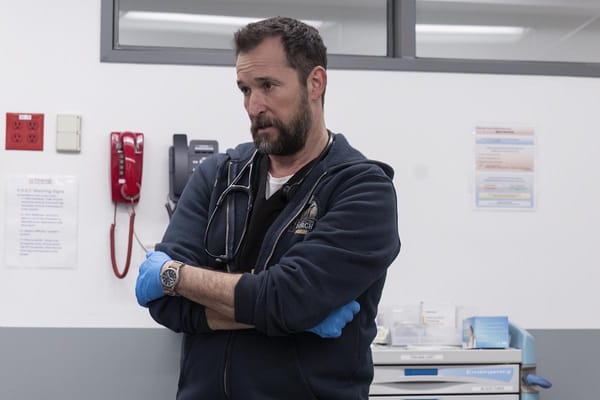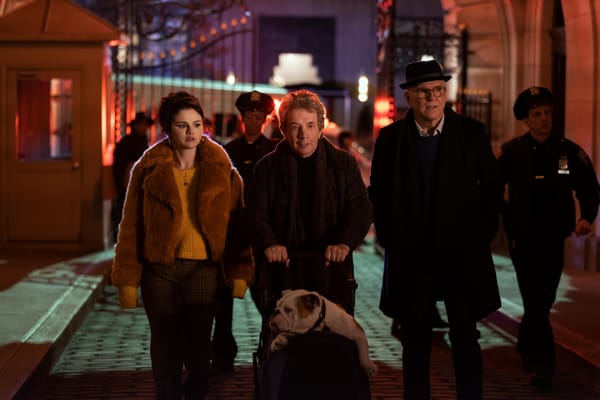👠↩️ Inneresting #247 - You were supposed to be the good guys
From heel turns to sudden self-awareness, sometimes it's not easy to know who the baddies are.

Faran Smith Nehme rounds-up some notes focused on a Criterion Collection series on casting against type—when heroic actors play villains. It covers Henry Fonda's surprisingly evil turn in Once Upon a Time in the West, Andy Griffith in A Face in the Crowd, and many others.
But when a story's on the page and the cast isn't even a twinkle in a producer's eye yet, what can a writer do to play with the same kind of surprise that comes when we don't know who's actually a baddie?
Superkick Studios provides an in-depth look at John Cena’s recent heel turn in the WWE, following how the arc of his performance over the last several years created the narrative setup to explain why a good guy would go bad.
“We all go through patches where we make decisions against our value system. We all turn heel at one point. It’s just a matter of if you see the light, and I think that’s what makes a lot of the characters redeemable is take a really good good good guy, and have them lose their way. It’s Darth Vader. It’s Star Wars.”
–John Cena
Jumping off from Cena's observation, what if a supposedly heroic character hasn't realized they've crossed a line? Can showing that moment of recognition help lead to redemption?
Charles J. Thomas looks at the multi-episode arc of Sasha Waybright in Amphibia, and how she had to confront her past actions on two different worlds before realizing she had main character energy, but wasn't acting like a hero. For a more explicitly comedic take, watch this clip from The Venture Bros., where failed/failing super scientist Rusty Venture finally clocks that his new business consultant (Dr. Henry Killinger) has some ulterior motives:
Dr. Killinger would fit into the category of The Evil Mentor, something Michael Tabb explores in a post that's broadly about Mentor characters, but hones in on False Mentors and Mentor as Antagonist.
Let's take a closer look at a specific example: Henri Ducard/Ra's al Ghul in Batman Begins. Before Bruce Wayne climbs a mountain in search of The League of Shadows, he meets Henri Ducard, who suggests that Wayne needs some guidance.
After Bruce enters the temple, the audience gets set up to take Ducard at face value. There's a man sitting on a throne, who everyone else looks to with deference, and who Ducard appears to translate for. This is a show for both Bruce and the audience, setting up this idea of Ra's al Ghul and Ducard as separate people:
The audience gets to see Ducard not only acting as mentor to Bruce, but becoming a confidant. While he's a harsh teacher, the combination of the audience's understanding of the tropes of the Cinematic Training Montage with the story that Ducard weaves for Bruce. It creates plausible deniability for the audience member who might be thinking, "Okay, but this is sus."
And later comes the sudden but inevitable betrayal. Ducard explains the game he was playing, and how the entire city of Gotham hangs in the balance. The reveal isn't a complete surprise, and it shouldn't be. There were enough pieces of evidence to give the audience complete confidence in looking back that this was the truth from the beginning. Just like how Bruce was taught to deceive criminals, Wayne himself was deceived with theatricality and elevating a person to the idea of a myth:
With villainous reveals and realizations, there are questions to ask:
- What is the truth?
- What evidence will the audience have to confirm their expectations?
- What evidence will make them question their expectations?
- Who is being deceived: A heroic character about to be betrayed, or a character on a bad path lying to themselves?
👋 Are you new here?
Inneresting is a weekly newsletter about writing and things that are interesting to writers. Subscribe now to get more Inneresting things sent to your inbox.
Previously on Inneresting…
In case you missed it, in last issue’s most clicked link, Rach Smith shares a brief thought on the relationship between the frequency of putting out work and your perception of how good it must be to be worth sharing.
What else is inneresting?
- Elizabeth Doerr on Emma Pattee's Tilt, and how good apocalyptic fiction can help a person wrap their head around actual disaster preparedness.
- "On the Best (Worst) Best Man Speech Ever (at My Super Mario-Themed Wedding)" by Mike Drucker
- You don't need a special anniversary or even a logical segue to go back to 1999 and the strange (but still not strange enough) attempt by Garth Brooks to perform as Chris Gaines.
And that’s what’s inneresting this week!
Inneresting is edited by Chris Csont, with contributions from readers like you and the entire Quote-Unquote team.
Are you enjoying this newsletter?
📧 Forward it to a friend and suggest they check it out.
🔗 Share a link to this post on social media.
🗣 Have ideas for future topics (or just want to say hello)? Reach out to Chris via email at [email protected], Bluesky @ccsont.bsky.social, or Mastodon @[email protected].
Post-Credits Scene
TFW you realize your boss was the Big Bad the whole time.




